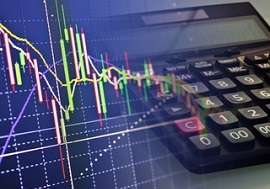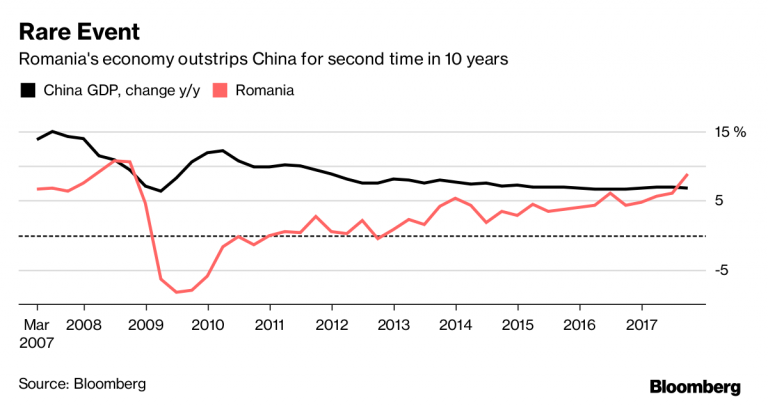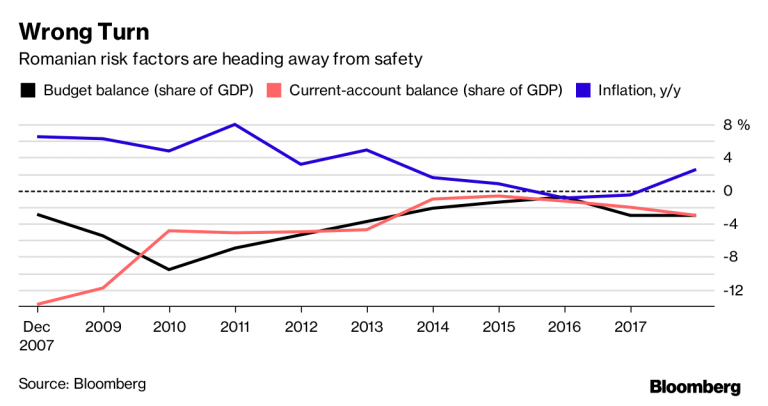 The distrust regarding the health of Romania’s economic growth makes foreign analysts remember that the last time when Romania outpaced China in terms of the economic growth rhythm was in 2008, just before the outbreak of the global financial crisis.
The distrust regarding the health of Romania’s economic growth makes foreign analysts remember that the last time when Romania outpaced China in terms of the economic growth rhythm was in 2008, just before the outbreak of the global financial crisis.
This is the idea put forward in an editorial from Bloomberg, published Friday morning.
 „After politicians enjoyed that success, the Balkan state has been severely affected by the crisis and had to look for an international financial assistance of EUR 20 billion (USD 24 billion),” says the source quoted.
„After politicians enjoyed that success, the Balkan state has been severely affected by the crisis and had to look for an international financial assistance of EUR 20 billion (USD 24 billion),” says the source quoted.
After nearly a decade, „Romania’s 8.8 percent annual growth in the last quarter has eclipsed the second largest economy in the world as a result of the consumption-driven boom, as a result of tax cuts and the increase of wages in the public sector”.
At the same time, although they are not at the levels registered in the pre-crisis period from 2008, indicators such as inflation and current account deficit cause worries.
 „This Chinese type of economic growth should make decision-makers think what they will do next. Romania faces slippages that financial markets will not ignore,” said Ionut Dumitru, Chief Economist of Raiffeisen Bank Romania and Chairman of the Fiscal Council, quoted by Bloomberg.
„This Chinese type of economic growth should make decision-makers think what they will do next. Romania faces slippages that financial markets will not ignore,” said Ionut Dumitru, Chief Economist of Raiffeisen Bank Romania and Chairman of the Fiscal Council, quoted by Bloomberg.
Today’s imbalances are not trivial: the budget deficit inflates up to the EU’s threshold, the demand for consumption propels imports and the current account deficit, and consumer prices are rising.
Bond yields have already gone up, anticipating the end of nearly two years of low interest rates, while the Romanian leu had the poorest performance against the euro this year, among the Eastern European states.
Although Romania is still the second poorest country in the EU, a decade after the accession, the Government argues that measures such as raising the minimum wage are needed to reduce the gap to the richer states of the EU bloc.
The National Bank of Romania is worried that the fiscal loosening comes at the expense of investment and loses its value, and Bloomberg quotes Governor Isarescu when he invokes the need for a better mix of economic policy measures and complains that Romania does not learn from its own history: „How many times do we have to hit rock bottom until we learn from history?”
On the other hand, though, Bloomberg does not quote the BNR Governor’s statements when he said that the comparison with the year of the crisis is inappropriate because the macroeconomic imbalances would allegedly be much lower: „we have a relatively stable macroeconomic balance,” said Mugur Isarescu.
Romania’s GDP grew by 2.6% in real terms in the third quarter compared to the previous quarter, by 8.8% on gross series and 8.6% on seasonally adjusted series compared to the similar period of last year, according to the „signal” estimates published Tuesday by the National Institute of Statistics (INS).









